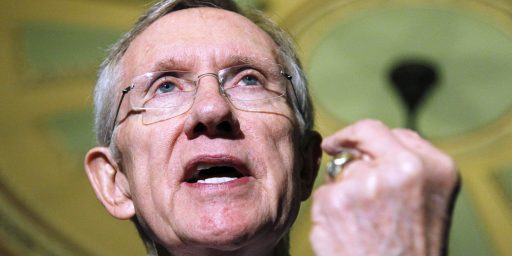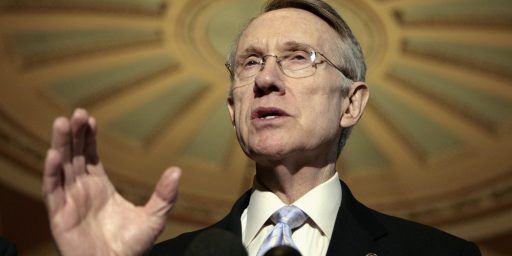Harry Reid: No Rush On President Obama’s Jobs Bill
The President of the United States is touring the country promoting his jobs bill with shouts of “Pass This Bill” and telling crowds “If you love me, help me pass this bill.” In the Senate, however, even his fellow Democrats aren’t in a rush to get anything passed:
Democratic Senate Majority Leader Harry Reid said Republicans won’t support President Barack Obama’s jobs plan, but he still wants them to vote on the sweeping $450 billion economic recovery effort.
“We are going to have the Republicans belly up to the bar to turn down this plan,” Reid said during a virtual town hall meeting with supporters Wednesday.
Reid said he won’t immediately take up Obama’s plan because the Senate must tackle other issues first. He didn’t specify which bills would receive priority over Obama’s economic solution.
That doesn’t exactly sound like the fierce urgency of now:
Senator Harry Reid of Nevada, the majority leader, has said he will put the bill on the legislative calendar but has declined to say when. He almost certainly will push the bill — which Mr. Obama urged Congress to pass “right now!” — until after his chamber’s recess at the end of the month; Mr. Reid has set votes on disaster aid, extensions for the Federal Aviation Administration and a short-term spending plan ahead of the jobs bill.
Part of the reason for the delay may be that some Senate Democrats still aren’t sold on the plan:
Democrats, as is their wont, are divided over their objections, which stem from Mr. Obama’s sinking popularity in polls, parochial concerns and the party’s chronic inability to unite around a legislative initiative, even in the face of Republican opposition.
Some are unhappy about the specific types of companies, particularly the oil industry, that would lose tax benefits. “I have said for months that I am not supporting a repeal of tax cuts for the oil industry unless there are other industries that contribute,” said Senator Mary L. Landrieu of Louisiana.
A small but vocal group dislikes the payroll tax cuts for employees and small businesses. “I have been very unequivocal,” said Representative Peter A. DeFazio, a Democrat from Oregon. “No more tax cuts.”
His voice rising to a near shriek, he added: “We have the economy that tax cuts give us. And it’s pretty pathetic, isn’t it? The president is in a box.”
There are also Democrats, some of them senators up for election in 2012, who oppose the bill simply for its mental connection to the stimulus bill, which laid at least part of the foundation for the Republican takeover of the House in 2010.
“I have serious questions about the level of spending that President Obama proposed,” said Senator Joe Manchin III, a Democrat from West Virginia, in a statement issued right after Mr. Obama spoke to a joint session of Congress last week.
President Obama’s tour of the country, then, is likely aimed as much as reluctant Democrats as it is at the GOP, even though it’s GOP intransigence against the bill, which has yet to be actually introduced as an actual bill in the House of Representatives where it must first be voted on, that the President cites in his speeches. As it turns out, though, those speeches don’t seem to be spurring much action by the American people:
So what are lawmakers hearing?
“Just a trickle of calls,” said Hunter Lipscomb, a spokesman for freshman Rep. Steven Palazzo, R-Miss.
When Obama asked voters this summer to let Republican lawmakers know their opinions during the debt ceiling debate, constituents jammed phone lines across Capitol Hill, and crashed many members’ websites.
But Congress isn’t hearing much about Obama’s jobs plan, a $447 billion package of tax cuts and tax credits for individuals and small businesses, along with new spending on schools, teachers, roads and bridges, aimed at putting millions of Americans back to work.
Alex Cruz, a spokesman for Rep. Ileana Ros-Lehtinen, R-Fla., said her office had received 21 calls supporting the president’s jobs proposal and five calls against it, “a tad” more than on a typical bill, but nothing out of the ordinary.
“So far, it is nothing compared to the volume on the debt limit vote,” said Sarah Little, a spokeswoman for Republican Sen. Pat Roberts of Kansas.
The muted response from voters isn’t what the White House was hoping for amid dismal economic warnings and the president’s plummeting job-approval numbers.
I should think not. Between the Senate Majority Leader saying that the bill won’t even be taken up this month by the lower chamber, there’s no reason for the House to rush either, and the muted reaction of the American people to the President’s barnstorming so far suggests that this bill isn’t going anywhere.







Amazing how impotent the president seems to be. Not sure if that is a result of the WH bungling strategy and how to get solid messages out or if this is just a reflection of such a divided broken government system. Maybe it is both. Truly sad to see what was once a great nation start to crumble. And to clarify that isn’t a statement that it all started under Obama as i think it started during the last administration when we lost our moral compass. It is now just continuing to accelerate.
What’s so amazing? He’s a complete failure.
Reid will never bring the jobs bill…. assuming one exists… to the floor. The reason is simple… there’s too many Democrats in the Senate up for re-election who won’t be re-elected should they sign on for Obama’s nearly naked power grab.
There’s almost no incentive for congressional Democrats to invest their own political capital on a bill that they know won’t pass as-is and will ultimately end up with a compromise between the White House and Republicans without their input, just like everything else.